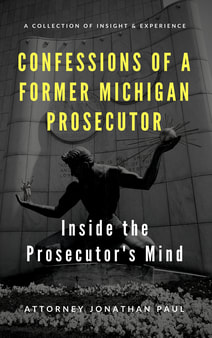Michigan Retail Fraud Attorney
|
Need Help? Call Me: (248) 924-9458Q: Can I travel during my retail fraud shoplifting case?
A: To travel during your retail fraud shoplifting case, your attorney must obtain permission from the judge. While this request is generally granted, the outcome depends on factors such as the specific charge, your criminal history, and the destination of your travel. It is more likely to be granted permission to travel within the state rather than outside the country. It is advisable to discuss your travel plans with your attorney to navigate this process effectively. Q: What does discovery mean in a retail fraud shoplifting case? A: In a criminal case, discovery refers to all the documentation and evidence held by the police department and the prosecutor's office. This may include additional discovery obtained from third parties such as hospitals, banks, or pawn shops. The primary element of discovery is typically the police report. It is important to note that the discovery process is ongoing, and new information may become available throughout the duration of your retail fraud shoplifting case. Q: What is a prosecutor in a retail fraud shoplifting case? A: The prosecutor is a representative of the state, county, city, or township who brings charges against you in a retail fraud shoplifting case. The prosecutor may be an elected official, such as a county prosecutor, or a hired local prosecutor. In court, you will likely interact with assistant prosecutors who work under the elected prosecutor's authority and represent the state's interests. Q: Is a magistrate the same as a judge in a retail fraud shoplifting case? A: In a retail fraud shoplifting case, a magistrate typically presides over arraignments and handles traffic offenses. If you are arraigned on a new charge, you may appear before a magistrate instead of a judge. While magistrates are not typically elected like judges, they possess significant authority to influence the course of your case. It is important to show respect to a magistrate and address them as "your honor." Q: Can I bring a friend or family member to court for my retail fraud shoplifting case? A: Yes, the courtroom is generally open to the public, allowing you to bring friends or family members for support during your retail fraud shoplifting case. Having a familiar face present can provide comfort, particularly for first-time offenders. However, it is important to note that the presence of a friend or family member does not directly impact the outcome of your case. It may be beneficial during sentencing as your attorney can emphasize the presence of a strong support system. Q: How long will I have a criminal record for retail fraud shoplifting? A: The duration of a criminal record for retail fraud shoplifting depends on the specific offense. Traffic offenses, including drunk driving, generally cannot be removed from your record. However, some offenses may be eligible for expungement after five years, provided you meet certain requirements. First-time offenders may have opportunities for deferred sentences, where successful completion of the sentence leads to no criminal record. Q: Will I ever get a job with a retail fraud shoplifting conviction? A: Having a retail fraud shoplifting charge or conviction can impact your ability to obtain or retain employment. Certain crimes, such as drunk driving or assault, can present significant obstacles in securing employment. However, the most significant barrier is typically a felony conviction. It is crucial to discuss your specific situation with your attorney and explore potential strategies to mitigate the impact on your job prospects. Q: Where can I find the courthouse for my retail fraud shoplifting case? A: If you have a scheduled court appearance, the courthouse address should be listed on the appearance notice. If not, you can search for the specific court's name online to find the address. Many websites provide comprehensive lists of courthouses in each Michigan county. By selecting the relevant county, you will be provided with a list of courthouses within that jurisdiction. Q: What should I wear to court for my retail fraud shoplifting case? A: It is advisable to dress in a manner similar to meeting the President of the United States or attending a professional job interview when appearing in court for your retail fraud shoplifting case. The first impression you make is crucial, and both the judge and prosecutor will take note of your attire. Your attorney will provide specific guidance on appropriate courtroom attire to present yourself favorably and enhance your chances of a positive outcome. Q: Will I have to speak in court during my retail fraud shoplifting case? A: For arraignments and pre-trial court dates related to your retail fraud shoplifting case, you will generally have to say very little in court. You should be prepared to respond with "yes, your honor" and "no, your honor." If you are entering a plea or being sentenced, your attorney will prepare you for what you need to say. The only instance where you may need to speak at length is if your case proceeds to trial, and you testify as a witness in your own defense. Q: How long will my court date last for my retail fraud shoplifting case? A: Court appearances for retail fraud shoplifting cases often involve extended waiting periods with minimal actual court proceedings. If your case is scheduled for 1 pm, for example, it is possible that you may not have your case called until around 2:30 pm. Once your case is called, unless there is a pre-trial hearing or a trial, your appearance before the judge may last anywhere from 30 seconds to 10 minutes. Much of the negotiation and discussion occurs before or after the court appearance. Q: Why did my lawyer speak to the judge without me during my retail fraud shoplifting case? A: When your attorney speaks to the judge without your presence during your retail fraud shoplifting case, it is known as a bench conference. These discussions allow your attorney to communicate with the judge and prosecutor privately, without creating an official court record. Some matters are better addressed outside the public's ear, and the bench conference offers an opportunity for effective communication. There is generally no cause for concern, as it is a routine practice. If you wish, you are entitled to approach the bench as well, but it is usually more effective to allow your attorney to handle these discussions. Q: Am I going to jail or prison for my retail fraud shoplifting case? A: Most first-time offenders charged with misdemeanor retail fraud shoplifting do not receive jail sentences. However, the outcome can vary depending on the court and the judge involved. If you are charged with a felony, the potential consequences become more uncertain, as Michigan felonies are subject to the state's sentencing guidelines. Certain felonies carry mandatory prison sentences, which cannot be avoided. The specific circumstances of your case and the decisions made by the judge will influence the potential outcome. |



